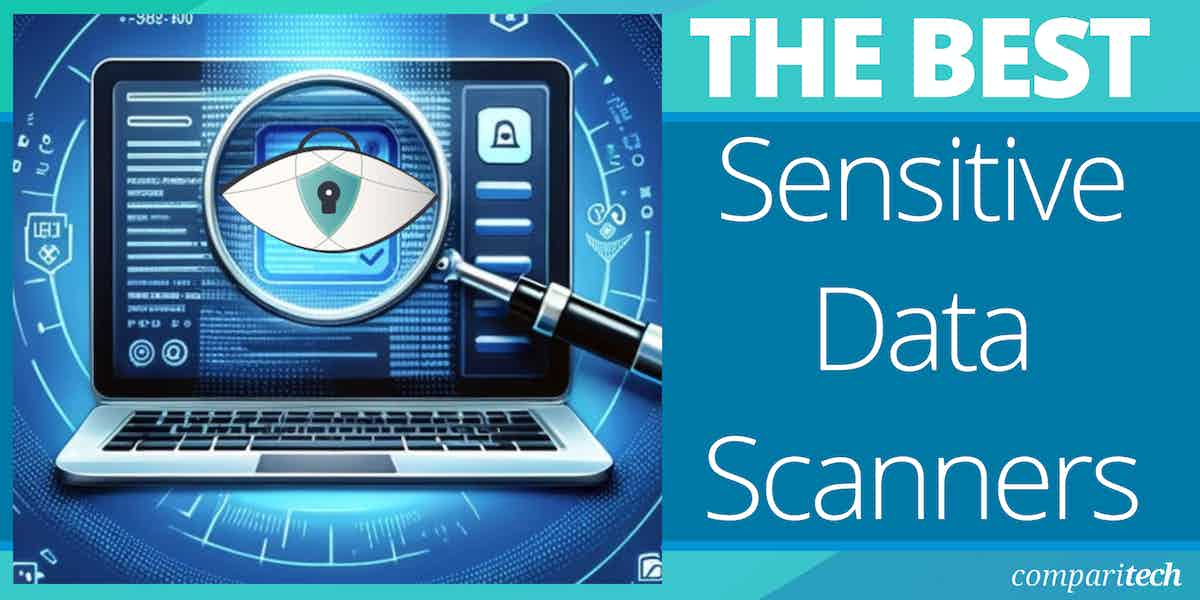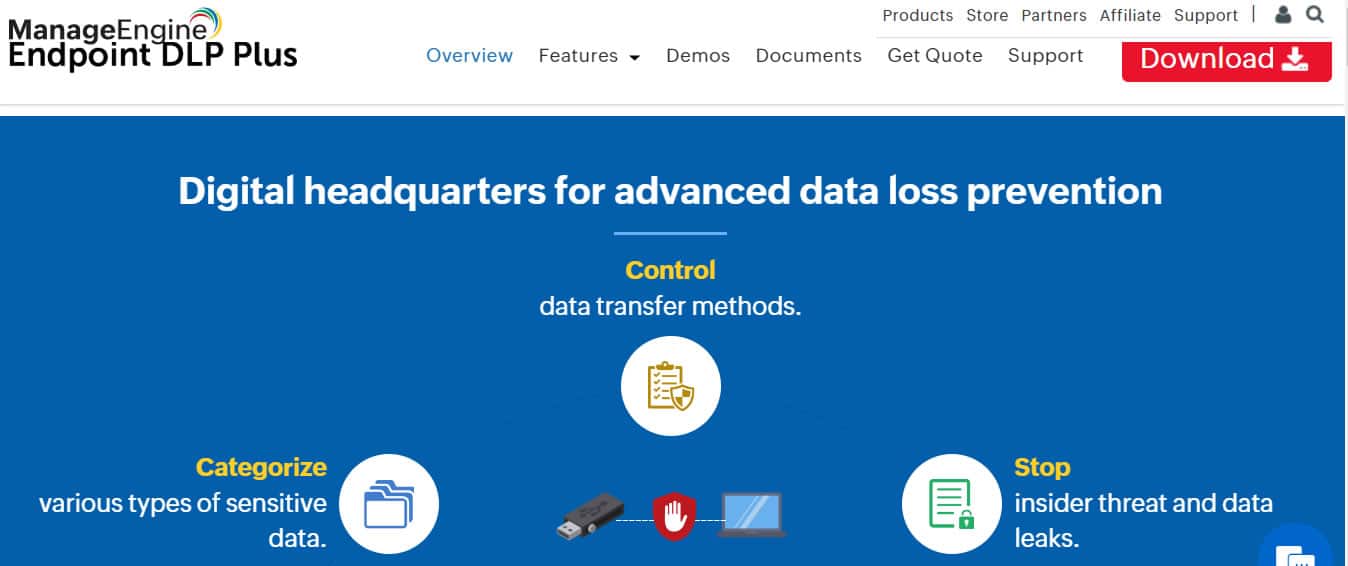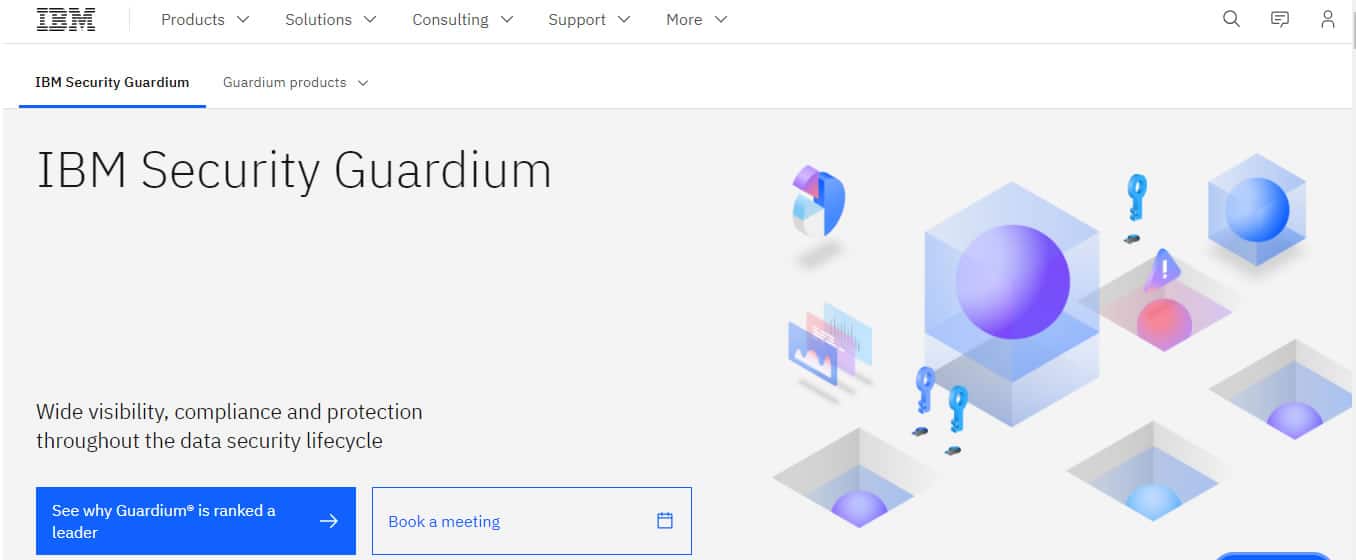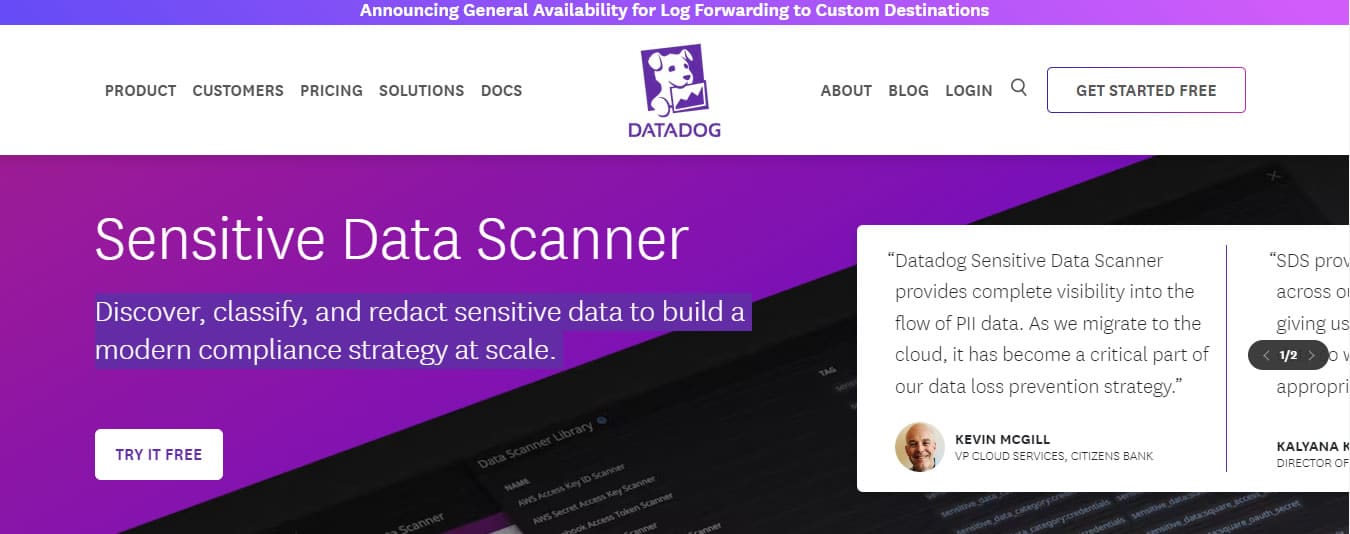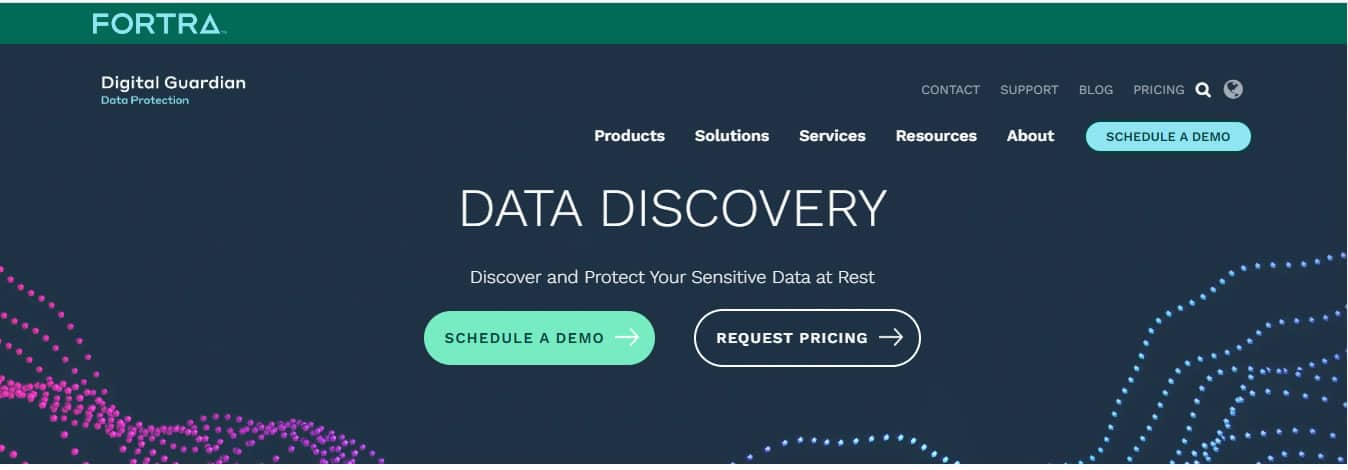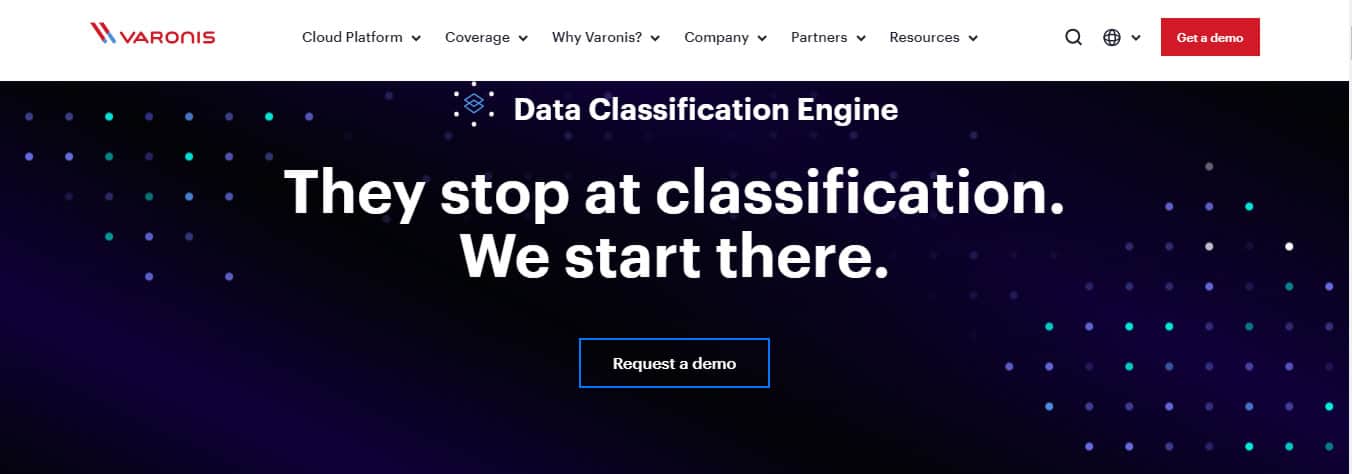In a world where data is the lifeblood of modern business operations, safeguarding sensitive information has never been more critical
The evolving digital landscape brings with it a myriad of data security challenges, making the role of sensitive data scanners paramount in protecting invaluable assets. From personally identifiable information (PII) to intellectual property (IP), the quest to fortify data privacy and compliance standards has spurred the development of cutting-edge solutions.
Here is our list of the best sensitive data scanners:
- ManageEngine Endpoint DLP Plus EDITOR’S CHOICE This on-premises package provides access and movement controls as well as sensitive data discovery and classification. Runs on Windows Server. Start a 30-day free trial.
- IBM Guardium This compliance auditing package includes a sensitive data discovery and classification component that applies to on-premises and cloud systems. This is a cloud-based service.
- Datadog Sensitive Data Scanner A cloud-based scanner that can be integrated into other Datadog tools to identify new PII instances immediately.
- Digital Guardian Protects data on Windows, macOS, and Linux computers. and cloud platforms from a SaaS package or a network appliance.
- Spirion Sensitive Data Platform Scans all data storage and enables PII storage to be focused in limited locations.
- Netwrix Data Classification Scans files and databases with a focus on Microsoft systems. Runs on Windows Server.
- Varonis Platform A SaaS package that scans servers and cloud platforms, indexing sensitive data for DSAR response.
In this article, we shine a spotlight on the leading solutions in sensitive data discovery scanning. From comprehensive scans and accurate contextual analysis to intelligent classification and robust protection measures, these scanners stand as sentinels of modern data security. Join us as we embark on a journey to discover how these sensitive data scanners are revolutionizing data protection strategies, enabling businesses to navigate the intricate landscape of privacy regulations and digital threats with confidence.
The Best Sensitive Data Scanners
Our methodology for selecting a sensitive data scanner
We reviewed the market for sensitive data discovery and classification systems and analyzed tools based on the following criteria:
- A scanner that can access servers and workstations running different operating systems
- Services to scan cloud platforms
- A system that is able to read through files and databases
- Shadow copy identification
- Nice to have a linked file integrity monitor
- A free trial or a demo for an opportunity to test the system before buying
- Value for money from sensitive data discovery and classification system that can be integrated into a data protection service
1. ManageEngine Endpoint DLP Plus (FREE TRIAL)
Endpoint DLP Plus is a comprehensive data privacy and privacy management solution designed for organizations dedicated to safeguarding sensitive information and maintaining compliance with global data protection regulations. This powerful tool provides an array of features to manage and protect data effectively across diverse IT environments.
Key Features:
- Sensitive Data Discovery: Automates the identification and classification of sensitive data across all digital platforms.
- Real-Time Monitoring: Tracks data access and modifications in real-time, ensuring immediate detection of unauthorized activities.
- Comprehensive Compliance Management: Includes tools to automate compliance with regulations such as GDPR, HIPAA, and PCI DSS.
- Advanced Encryption: Protects data by encrypting sensitive files and databases, preventing unauthorized access.
- User Behavior Analytics: Analyzes user actions to identify and respond to abnormal behavior that could indicate potential data breaches.
Endpoint DLP Plus excels in identifying and managing sensitive data within an organization’s network. It provides sophisticated scanning functionalities that not only discover data but also classify it according to sensitivity levels, making it a critical component in the implementation of data protection strategies.
Why do we recommend it?
Endpoint DLP Plus is essential for businesses that handle significant amounts of personally identifiable information (PII) and need to adhere to stringent compliance standards. Its capabilities extend beyond mere data protection, providing a holistic approach to privacy management that includes data discovery, real-time monitoring, and comprehensive compliance tools.
This platform’s automated scanning and classification of data simplify the complex process of protecting sensitive information as it proliferates across on-premises and cloud environments. By monitoring data interactions and utilizing advanced encryption, Endpoint DLP Plus ensures that all sensitive information is securely managed and protected from potential threats, both internal and external.
ManageEngine Endpoint DLP Plus employs cutting-edge techniques such as “fingerprinting” to identify sensitive data stores across the network. This goes beyond the traditional storage formats and allows for the identification of PII even in unconventional data formats. Once sensitive data is identified, ManageEngine Endpoint DLP Plus tracks all access to it. It allows organizations to designate trusted applications that can access or originate sensitive data, preventing unauthorized data exports. The solution monitors not only data stored on endpoints but also data movements within emails and to cloud platforms. This all-encompassing approach ensures that data protection policies are consistently enforced.
ManageEngine Endpoint DLP Plus is ideal for the following use cases:
- Small and Large Businesses ManageEngine Endpoint DLP Plus is tailored to meet the needs of businesses of all sizes. From small businesses benefiting from the Free edition to larger enterprises seeking complete data protection solutions, the tool caters to various requirements.
- Cross-Platform Protection While primarily available for Windows Server, the tool’s capabilities extend to data protection across multiple devices and applications, ensuring a cohesive security strategy.
- Data Management Compliance Organizations striving to meet data protection standards and compliance regulations, such as GDPR, find ManageEngine Endpoint DLP Plus an invaluable asset.
Who is it recommended for?
Endpoint DLP Plus is ideal for organizations that manage sensitive data and are subject to strict privacy regulations. It is particularly useful for entities required to comply with GDPR, HIPAA, or PCI DSS standards, providing them with the tools necessary to monitor and protect data effectively, whether stored on servers or in the cloud.
Pros:
- Robust Data Protection: Ensures sensitive data is secure and managed according to best practices and regulatory requirements.
- Detailed Compliance Reporting: Automates compliance reporting, making it easier to meet legal obligations and minimize risks.
Cons:
- Complex Setup: The configuration process can be intricate, requiring detailed planning and technical knowledge.
- Resource Intensity: May require significant resources, potentially impacting system performance in large-scale deployments.
A free 30-day fully functional trial is available on request.
EDITOR'S CHOICE
Endpoint DLP Plus earns the “Editor’s Choice” for its exceptional capabilities in data loss prevention and privacy management. This tool stands out for its comprehensive approach to protecting sensitive information, making it a cornerstone for any organization focused on data security. With its robust feature set, including advanced data discovery, real-time monitoring, and stringent compliance management, Endpoint DLP Plus offers a reliable and effective solution for safeguarding critical data. The platform’s strength lies in its ability to seamlessly integrate with existing IT infrastructures, providing detailed insights into data usage and security. The encryption features ensure that sensitive data is protected both at rest and in transit, while the user behavior analytics enhance security by detecting and responding to unusual activities that could indicate a breach. Lastly, the extensive compliance management tools simplify the adherence to global data protection regulations such as GDPR, HIPAA, and PCI DSS, helping organizations avoid hefty fines and reputational damage. During testing, I found Endpoint DLP had the best balance of scalability, features-set, and ease of use among similar products.
Download: Get a 30-day free trial
Official Site: https://www.manageengine.com/endpoint-dlp/
OS: Cloud-based
2. IBM Guardium
IBM Security Guardium is a robust data protection solution that provides sensitive data discovery scanning functions and other security capabilities, making it an indispensable tool for organizations seeking to safeguard their data in today’s complex cybersecurity landscape. The software automates compliance auditing and reporting, facilitates the discovery and classification of data and data sources, monitors user activity, and enables rapid responses to potential threats in near real-time.
Key Features:
- Data discovery
- Shadow copy identification
- Encrypts sensitive data stores
- Identifies structured and unstructured data
- Data Security Posture Management
Why do we recommend it?
IBM Guardium is a data security platform that is delivered from the cloud. This tool will scan all of your data locations, which includes both on-premises servers and cloud platforms. The package is able to identify shadow copies of documents that productivity tools, such as Word store to aid document recovery. The system helps you to formulate a data security policy that coordinates with your data security standards obligations.
Guardium excels in discovering and classifying sensitive data across the enterprise. It employs sophisticated algorithms and techniques to identify sensitive information like credit card numbers and personal financial data. This process is vital as organizations expand and data proliferates across multiple locations, often beyond the knowledge of the current data owners. Guardium’s data discovery capability provides a foundation for effective data protection, which includes data activity monitoring and user behavior analytics. This means that any unusual or suspicious activity related to sensitive data is promptly detected and flagged. By continuously monitoring data access and changes, the software helps organizations identify potential threats from both internal and external sources.
IBM Security Guardium makes it easy for organizations to comply with various cloud compliance and regulatory standards such as PCI DSS, SOX, HIPAA, GDPR, and more. By employing prebuilt templates tailored to different regulations, Guardium streamlines and automates compliance workflows. This feature ensures that organizations are consistently meeting the requirements of data protection regulations, minimizing the risk of costly fines and legal repercussions.
Who is it recommended for?
This is a service that caters to businesses that manage the personally identifiable information (PII) of private individuals. This protection requirement is particularly important to businesses that need to follow standards such as PCI DSS, HIPAA, or GDPR. The tool is able to monitor data that is stored on servers and on cloud platforms.
Pros:
- Helps with data protection standards compliance
- Formulates a consistent data management policy
- Ongoing data access monitoring
- Protects sensitive data files with encryption
- Can identify data fields that represent PII only when viewed in combination
Cons:
- No on-premises hosting option
Guardium extends its protective reach to both on-premises and cloud-based data sources, aligning with the modern hybrid multi-cloud infrastructure that many organizations adopt. It enforces security policies in near real-time to safeguard data across the enterprise, regardless of where the data resides. Furthermore, the software’s compatibility with major cloud platforms such as Amazon AWS, Google Cloud Platform, Microsoft Azure, IBM Cloud, and Oracle OCI makes it an excellent fit for large organizations with diverse cloud environments.
3. Datadog Sensitive Data Scanner
Datadog Sensitive Data Scanner is a tool designed to help organizations identify, classify, and obscure sensitive data to build a modern compliance strategy at scale. It serves as an indispensable tool for building and sustaining a contemporary compliance strategy. It addresses the intricate challenge of handling Personally Identifiable Information (PII) and other sensitive data in an environment characterized by dynamic cloud deployments, diverse data sources, and hybrid infrastructures.
Key Features:
- Role-based access control
- Option to redact fields
- Scanning on-premises and for cloud storage
- Live data scanning
Why do we recommend it?
The Datadog Sensitive Data Scanner is a new service on the Datadog cloud platform but it can integrate into other Datadog services, such as its Application Performance Monitoring, Log Management, and Real User Monitoring units. This integration means that data can be classified as soon as it is generated.
Datadog’s Sensitive Data Scanner provides organizations with a holistic view of the flow of PII data. This heightened visibility empowers businesses to better manage and govern sensitive information, ensuring compliance with regulations like GDPR, HIPAA, CCPA, and more. Businesses can classify sensitive data based on its content, origin, or associated risk level. This granularity enables fine-tuned data management strategies that align with varying compliance needs.
The Sensitive Data Scanner expedites classification through preconfigured rules that recognize common data patterns like credit card numbers, API keys, and more. This feature minimizes the time and effort required to identify sensitive information. By scanning data for patterns of sensitive information upon ingestion, Datadog minimizes the risk of data leaks. The platform then employs hashing or redaction, following either predefined or customizable rules, to maintain data privacy while remaining compliant. Datadog extends its capabilities to discover sensitive data across cloud environments.
Datadog Sensitive Data Scanner is ideal for the following use cases:
- Cloud Migration During the transition to cloud-based infrastructures, organizations can deploy Datadog Sensitive Data Scanner to ensure that sensitive data is adequately managed and protected across the new environment.
- Data Privacy Compliance For businesses handling customer data subject to regulations like GDPR, HIPAA, and CCPA, Datadog’s platform offers a comprehensive solution to keep sensitive information secure and compliant.
- Hybrid Environments In scenarios where data is distributed across on-premises and cloud-based systems, Datadog’s ability to unify data classification and scanning processes is particularly advantageous.
Who is it recommended for?
Datadog is a cloud platform, so buyers don’t need to worry about whether they have the right operating system to host it. The Sensitive Data Scanner package is a subscription service, so there are no upfront acquisition costs to deal with. Businesses that already use the Datadog system monitoring tools will be more likely to sign up for the Sensitive Data Scanner.
Pros:
- Integrated into a cloud platform of system monitoring and management tools
- Compliance management for PCI DSS, HIPAA, GDPR, and other standards
- A redaction option to prevent employees from seeing sensitive data
- Live sensitive data discovery as PII is created and stored
Cons:
- No self-hosting option
4. Digital Guardian
Digital Guardian Data Discovery is a tool designed to help organizations discover and protect sensitive data at rest. The tool empowers organizations to uncover and identify sensitive and regulated data residing at rest within servers, shares, and databases. The solution is equipped with pre-configured templates that expedite the discovery of specific data types such as PHI, PCI, and PII, while also providing the flexibility to customize templates to align with emerging regulations like GDPR and diverse data formats.
Key Features:
- Data loss prevention
- Data discovery and classification
- Protects premises and cloud
Why do we recommend it?
Digital Guardian is a full data loss prevention platform that includes a data discovery and classification module so that data protection processes can be focused on sensitive data, while less important data can be processed without restrictions. The package can be tailored to identify data that is protected by specific requirements, such as PCI, HIPAA, or GDPR.
With meticulous documentation of sensitive data’s location and composition, Digital Guardian supports the formulation and enforcement of organizational security policies. Upon the completion of a discovery scan, managers are promptly notified of policy violations along with detailed lists of files and their locations. Automated action assignments, including deletion, encryption, or movement, ensure swift response to policy breaches. Markers left on files with policy violation details further streamline the remediation process.
Who is it recommended for?
Digital Guardian is available as a SaaS package or as a network appliance. The platform protects data held on computers running Windows, macOS, or Linux and it will also scan cloud platforms. Businesses that can’t source fully qualified technicians can opt for a managed service run by Digital Guardian.
Pros:
- Integrated data discovery with data protection
- Compliance management
- Scans databases as well as files
Cons:
- No price list
Digital Guardian’s Database Record Matching (DBRM) stands out as a feature that enhances accuracy by minimizing false positives and negatives. The Data Discovery module seamlessly integrates with the broader Digital Guardian platform, spanning cloud and on-premises environments, including its enterprise DLP solution. A free demo is available on request.
5. Spirion Sensitive Data Platform
Spirion prides itself as the leader in data discovery, persistent classification, and protection of sensitive data on-premise and in the cloud. Spirion empowers organizations to gain insight into their expansive landscape of sensitive data. Regardless of its structured or unstructured nature, Spirion Sensitive Data Platform dives deep into networks, clouds, and remote file servers to unearth a comprehensive array of sensitive information. From personally identifiable information (PII) to personal health information (PHI), personal credit data, and intellectual property (IP), Spirion leaves no stone unturned in identifying the data that matters most.
Key Features:
- Scours multiple sites
- Scans cloud platforms
- PII and intellectual property (IP)
Why do we recommend it?
Spirion Sensitive Data Platform is a cloud-based service that is able to detect all types of personally identifiable information (PII) and intellectual property (IP). The tool can be set up to scan multiple sites and cloud platforms. It discovers existing sensitive data on its initial sweep and then remains vigilant, spotting new instances as they are created.
Having located sensitive data, Spirion takes data protection a step further through intelligent classification. It accurately labels data in alignment with dynamic regulatory compliance standards and internal security policies. This classification empowers organizations to enforce data security controls that elevate their security and compliance posture while mitigating risks. Spirion’s intelligent classification allows for the application of appropriate protections, ensuring that sensitive data remains secure throughout its lifecycle.
With discovery and classification in place, Spirion ensures comprehensive protection by stringent compliance regulations and internal security policies. The platform deploys robust yet flexible protection measures that enable authorized administrators to access data for essential business operations — from its creation to its secure disposal. Spirion’s protection strategies are designed to safeguard sensitive data while facilitating critical business functions.
Who is it recommended for?
This package is a good choice for companies that have an uncontrolled spread of data. The package helps businesses to consolidate storage in a few areas, making it easier to track. It removes the shadow copies of files that productivity suites such as Microsoft 365 and Google Workspace create. It is able to scan file servers, databases, and cloud platforms.
Pros:
- Discovers intellectual property as well as PII
- Assists in consolidating storage to a small number of trackable locations
- Identifies both structured and unstructured data
Cons:
- No price list
Unlike traditional pattern matching, Spirion’s scans are driven by context clues. This innovative approach ensures unmatched accuracy, significantly reducing false positives and negatives to less than 2%. Spirion not only discovers sensitive data but also provides an intricate understanding of data assets. Organizations can track their assets, assign owners, describe assets, determine physical locations, and establish security postures.
6. Netwrix Data Classification
Netwrix Data Classification enables organizations to identify and classify sensitive and business-critical data across the enterprise, thereby mitigating the risk of data breaches and satisfying compliance requirements with less effort and expense. Unlike many other data classification tools that merely rely on keywords and regular expressions, this solution employs advanced techniques such as compound term processing and statistical analysis. Classification occurs through the analysis of file content, guided by rules established within taxonomies.
Key Features:
- On-premises software
- Protects file servers and cloud platforms
- Scans databases and spreadsheets
Why do we recommend it?
Netwrix Data Classifier is a systemwide scanner that can look through files held on your own servers and on cloud platforms. The system provides a quarantining system that blocks unauthorized access to files and it can work with applications to ensure that application access rights also control access to data.
To expedite the identification of sensitive and regulated data, Netwrix Data Classification incorporates an extensive selection of predefined taxonomies. These taxonomies encompass Personally Identifiable Information (PII) in line with GDPR, Protected Health Information (PHI) under HIPAA, payment card data compliant with PCI DSS, financial records, and other forms of protected information. By leveraging these taxonomies, organizations can efficiently locate and manage data that requires heightened security measures.
Netwrix Data Classification is ideal for use in environments where data diversity and security are paramount concerns. It finds its prime utility in industries handling sensitive customer information, such as healthcare, finance, and e-commerce. Additionally, it suits organizations striving to uphold stringent compliance requirements, including GDPR, HIPAA, and PCI DSS.
Netwrix can be easily set up within a few hours, and the time needed for initial classification hinges on factors like data volume, connection speed, chosen classification mode, server performance, and more. Subsequent data is incrementally indexed, leading to faster processing times. The solution seamlessly integrates with Microsoft Information Protection (MIP) labels, allowing for the application of these labels to documents.
Who is it recommended for?
This is a software package for Windows Server. The tool has wider capabilities for scanning Microsoft products, such as SQL Server databases or SharePoint file servers. The system is also able to scan cloud drives, including Dropbox, Google Drive, Box, and OneDrive. As well as scanning SQL Server databases, this tool can access data held in Oracle and PostgreSQL.
Pros:
- The scanner can be tuned to specific data protection standards
- Provides a DSAR data searching tool
- Generates metadata for files
Cons:
- Doesn’t include transfer or access controls – you need to buy another package for those
The licensing model offers flexibility, catering to diverse organizational needs. Netwrix Data Classification is licensed based on data sources, with the choice of a subscription or perpetual licensing model. Typically, applications are licensed per enabled Active Directory user. A free 20-day trial is available on request.
7. Varonis Platform
Varonis is a platform designed to help organizations automatically classify and label sensitive data, reduce exposure, alert on suspicious access behavior, as well as perform other data security functions. It is powered by the Varonis Data Classification Engine. Veronis prides itself on an all-in-one platform to automatically find critical data, eliminate exposure, and stop threats, whether your data is multi-cloud or on-premises, in buckets, or in files. The Varonis Data Classification Cloud automatically discovers where sensitive data might be hiding in your cloud infrastructure.
Key Features:
- Sensitive data scanning and classification
- User behavior tracking
- Anomalous behavior alerts
Why do we recommend it?
Varonis is a sensitive data scanner that also manages access permissions. A file can be defined as high risk, which restricts the people who would be allowed to access it. Low-risk files can be accessed by anyone. This enables an administrator to make general files available to the public – for example, sales brochures.
Veronis comes with an automatic sensitivity labeling feature. By applying persistent labels, organizations can encrypt, obfuscate, or even enforce Digital Rights Management (DRM). The solution also enables organizations to automatically revoke unnecessary access rights without disrupting critical business operations. Veronis’ ability to automatically quarantine sensitive data that becomes exposed represents a proactive approach to data protection. In the event of a breach or inadvertent exposure, the solution acts swiftly to isolate compromised data, preventing further unauthorized access and containing potential damages.
Who is it recommended for?
Varonis is a good choice for businesses that deal with PII alongside less sensitive files. The tool enables the imposition of granular access controls that range from named-user permissions out to general access. The system tracks user activity and alerts if an attempt is made to access a protected file.
Pros:
- Enforces specific data protection standards
- Provides live activity monitoring
- Search utility for fast DSAR responses
Cons:
- No price list
Varonis addresses the growing significance of Data Subject Access Requests (DSARs) by automatically indexing regulated data. This indexing enables organizations to swiftly retrieve and handle data required for DSAR responses. By expediting this process, Veronis enables organizations to demonstrate compliance while saving time and resources. Veronis is ideal for global organizations, cloud-centric environments, and regulated industries governed by stringent data protection regulations, such as healthcare, finance, and legal services. A free demo is available on request.

